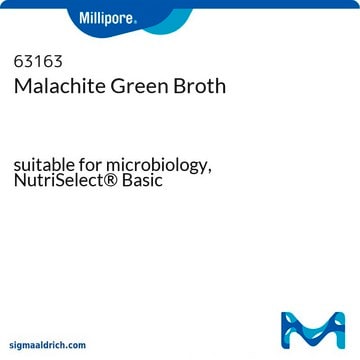66742
Dichloromethane
Selectophore™, ≥99.5%
Synonym(s):
Methylene chloride
About This Item
Recommended Products
grade
for ion-selective electrodes
Quality Level
vapor density
2.9 (vs air)
vapor pressure
24.45 psi ( 55 °C)
6.83 psi ( 20 °C)
description
solvent for preparation of membranes
product line
Selectophore™
Assay
≥99.5% (GC)
≥99.5%
form
liquid
autoignition temp.
1223 °F
contains
~0.005% amylene as stabilizer
expl. lim.
22 %
refractive index
n20/D 1.424 (lit.)
n20/D 1.424
bp
39.8-40 °C (lit.)
mp
−95 °C (lit.)
density
1.324-1.326 g/mL at 20 °C
1.325 g/mL at 25 °C (lit.)
SMILES string
ClCCl
InChI
1S/CH2Cl2/c2-1-3/h1H2
InChI key
YMWUJEATGCHHMB-UHFFFAOYSA-N
Looking for similar products? Visit Product Comparison Guide
Related Categories
General description
Application
- New Two-Photon Absorbing Squaraine Derivative with Efficient Near-Infrared Fluorescence, Superluminescence, and High Photostability.: This research investigates a novel squaraine derivative, noting its application in two-photon absorption. The use of dichloromethane in the solvent system is critical for achieving high photostability and fluorescence properties in near-infrared applications (Bondar et al., 2022).
- Identification of Antibacterial Sterols from Korean Wild Mushroom Daedaleopsis confragosa via Bioactivity- and LC-MS/MS Profile-Guided Fractionation.: This study utilized dichloromethane for the extraction of antibacterial sterols from the Daedaleopsis confragosa mushroom. The findings contribute to understanding the chemical properties and potential therapeutic uses of natural extracts (Na et al., 2022).
- Anti-Inflammatory Activity and Chemical Analysis of Different Fractions from Solidago chilensis Inflorescence.: This research highlights the anti-inflammatory properties of Solidago chilensis inflorescence, with an emphasis on the role of dichloromethane in fractionating and analyzing the plant′s active chemical components (de Brito et al., 2021).
- Evaluation of analytical method for polycyclic aromatic hydrocarbons content in home meal replacement products by GC/MS.: This publication discusses the development of an analytical method for detecting polycyclic aromatic hydrocarbons in food products, where dichloromethane is utilized as part of the extraction process to ensure accuracy and efficiency in the GC/MS analysis (Lee et al., 2021).
Legal Information
Signal Word
Warning
Hazard Statements
Precautionary Statements
Hazard Classifications
Carc. 2 - Eye Irrit. 2 - Skin Irrit. 2 - STOT SE 3
Target Organs
Central nervous system
Storage Class Code
6.1D - Non-combustible acute toxic Cat.3 / toxic hazardous materials or hazardous materials causing chronic effects
WGK
WGK 2
Flash Point(F)
does not flash
Flash Point(C)
does not flash
Personal Protective Equipment
Choose from one of the most recent versions:
Already Own This Product?
Find documentation for the products that you have recently purchased in the Document Library.
Customers Also Viewed
Our team of scientists has experience in all areas of research including Life Science, Material Science, Chemical Synthesis, Chromatography, Analytical and many others.
Contact Technical Service



